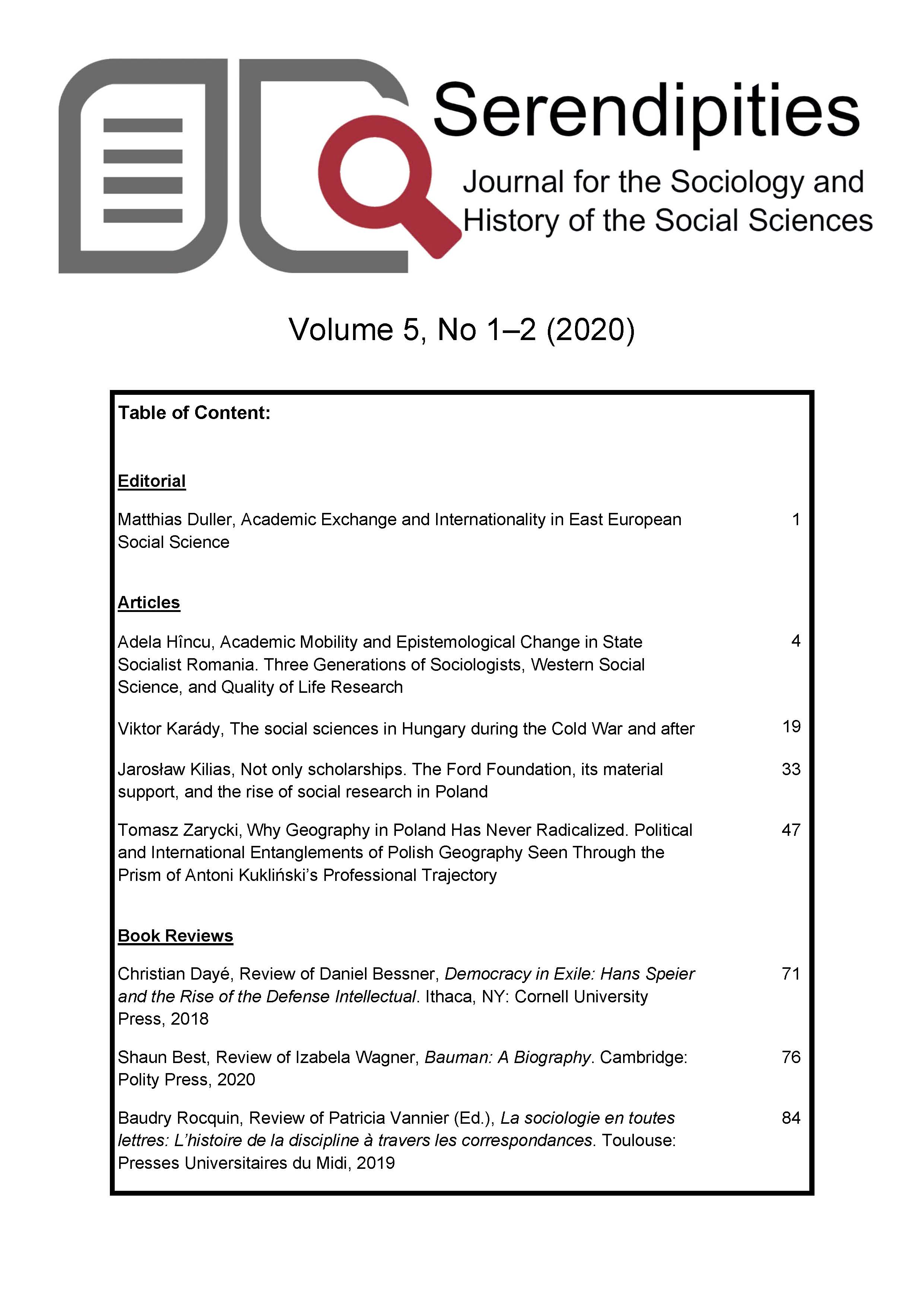The Social Sciences in Hungary During the Cold War and After
DOI:
https://doi.org/10.7146/serendipities.v5i1-2.126108Nøgleord:
history of the social sciences, Hungary, international influenceResumé
Based on various types of recently explored empirical evidence, this study attempts to account for the complex and ever-changing relationship the social sciences in Hungary have entertained with their foreign counterparts, both institutionally and through their intellectual references since their birth in the early 20th century. Historically, up until Communist times, Hungary was a German intellectual colony of sorts while remaining receptive mostly to French and other influences as well. This changed fundamentally after 1948 with the process of Sovietization. This implied the outright institutional suppression of several social disciplines (sociology, demography, political science, and psychoanalysis) and the forceful intellectual realignment of others along Marxist lines. Contacts with the West were also suspended and the exclusive orientation to Soviet social science enforced throughout the long 1950s. A thaw period after this attempt at Russian cultural colonization followed the years after the 1956 anti-Bolshevik uprising. From 1963 on, the Hungarian social sciences saw the reestablishment and state-supported promotion of disciplines that were suppressed earlier, the softening of the ascendancy of official Marxism, and the opening of channels of exchange with the West. In spite of the continuation of political censorship, ideological surveillance, and occasional expulsion of politically dissident scholars until 1989, Hungarian social scientists could benefit more often and intensively from Western sponsorship (such as study grants from the Ford foundation) and collaborations. After the fall of Communism, the expansion and reorientation of the social sciences to the West, dominated by Anglo-Saxon contacts, are demonstrated by various indices, such as data on the book market of the social sciences and books purchased by libraries, translated, or cited in major reviews.Referencer
Balla, Bálint (Ed.) (1974) Soziologie und Gesellschaft in Ungarn: aus dem Ertrag des ersten Jahrzehnts der neueren ungarischen Soziologie, Stuttgart: Enke, 4 vol.
Batygin, Gennady S. and Inna F. Deviatko (1994) The Metamorphoses of Russian Sociology, in: Mike F. Keen and Janusz L. Mucha (Eds.), Eastern Europe in Transformation. The Impact on Sociology, Westport: Praeger, 11-23.
Berényi, Eszter (2018) International influences in the Hungarian sociological profession, 1972-1994, in: Adela Hîncu and Victor Karady (Eds.), Social Sciences in the “Other Europe” since 1945, Buda¬pest: Pasts Inc., Center for Historical Research, Central European University, 249-279.
Duller, Matthias (forthcoming) The Anti-Communist Politics of East-West Scholar Exchanges in the Cold War, in: Waldemar Zacharasiewicz and Siegfried Beer (Eds.), Cultural Politics and Propa¬ganda: Mediated Narratives and Images in Austrian-American Relations, Vienna: Austrian Academy of Sciences Press.
Hîncu, Adela and Karady, Victor (Eds.) (2018) Social Sciences in the “Other Europe” since 1945, Budapest: Pasts Inc., Center for Historical Research, Central European University.
Illyefalvi, Lajos (1935) Die sozialen und wirtschaftlichen Verhältnisse der Bürgerlichen Bevölkerung in Budapest, Budapest: Kommunalstatistisches Amt.
Karady, Viktor (2012) Les Allemands dans l’intelligentsia moderne émergeante en Hongrie à l’époque de la Double Monarchie, Austriaca 1: 193-221.
Karady, Viktor (2018) Egy nagy kutatás margójára. Nemesek, keresztények, zsidók a peregrinus diákságban (1850-1918) [On the margin of a great investigation. Noblemen, Christians and Jews among Hungarian students abroad, 1850-1918], in: Universitas Historia. Tanulmányok a 70 éves Szögi László tiszteletére [Studies to honor László Szögi at his 70th anniversary], Budapest: Magyar Levéltárosok Egyesülete, 251-263.
Karady, Victor (2019) Les relations avec la France dans la sociologie hongroise naissante (1900-1944). Note de recherche, in La Revue d'Études Françaises du Centre Interuniversitaire d’Etudes Françaises (CIEF) de l’Université ELTE de Budapest, 2019/2, 21-32.
(https://core.ac.uk/download/pdf/232264805.pdf)
Karády, Viktor and Péter Tibor Nagy (2019) Sociology in Hungary. A Social, Political and Institu-tional History, New York: Palgrave-Macmillan.
Keen, Mike F. and Janusz L. Mucha (Eds.) (1994) Eastern Europe in Transformation. The Impact on Sociology, Westport: Praeger.
Keen, Mike F. and Janusz L. Mucha, (Eds.) (2003) Sociology in Central and Eastern Europe. Trans¬formation at the Dawn of the New Millennium, Westport, Connecticut: Praeger.
Kilias, Jarosław (2018) An Older Brother: Polish and Czechoslovak Sociology in the 1960s, in: Adela Hîncu and Victor Karady (Eds.), Social Sciences in the “Other Europe” since 1945, Budapest: Pasts Inc., Center for Historical Research, Central European University, 185-208.
Kiss, Gábor (1971) Marxismus als Soziologie. Theorie und Empirie in den Sozialwissenschaften der DDR, UdSSR, Polens, der CSSR, Ungarns, Bulgariens und Rumäniens, Reinbek (bei Hamburg): Rowohlt.
Koleva, Svetla (2018) Totalitarian Experience and Knowledge Production: Sociology in Central and Eastern Europe 1945-1989, Leiden: Brill.
Nagy, Péter Tibor and Victor Karady (2018) A Case of State Controlled Westernization. Foreign im¬pacts in the Hungarian social sciences (1945-2015), in: Johan Heilbron, Gustavo Sora, and Thibaud Boncourt (Eds.), The Social and Human Sciences in Global Power Relations, New York: Palgrave Macmillan, 297-332.
Péteri, György (1998) Academia and State Socialism. Essays on the Political History of Academic Life in Post-1945 Hungary and Eastern Europe, Boulder, Colorado: Social Sciences Monographs. Distributed by Columbia University Press.
Szűcs, László Gergely (2018) Limits and Revisions of the Marxist Canon: Western Philosophy in the Hungarian Philosophical Review, 1957-1980, in: Adela Hîncu and Victor Karady (Eds.), Social Sciences in the “Other Europe” since 1945, Budapest: Pasts Inc., Center for Historical Research, Central European University, 280-314.
Valuch, Tibor (2001) Magyarország társadalomtörténete a XX. Század második felében [Social history of Hungary in the second part of the 20th century], Budapest: Osiris.
Voříšek, Michael (2008) Antagonism, Type or Deviation? A Comparative View on Sociology in Post-War Soviet Europe, Revue d’histoire des sciences humaines 18: 85-113.
Downloads
Publiceret
Citation/Eksport
Nummer
Sektion
Licens
Copyright (c) 2021 Serendipities

Dette værk er under følgende licens Creative Commons Navngivelse – Ikke-kommerciel – Ingen Bearbejdede Værker (by-nc-nd).
CC-BY-NC-ND





